Auditing Assignment: AWA Collapse, Ethical Dilemmas and Audit Failures
VerifiedAdded on 2022/11/17
|10
|2586
|79
Report
AI Summary
This report provides a detailed analysis of the AWA case, a significant corporate collapse in Australian financial history, highlighting the role of external auditors and their negligence. The report examines the failures of Deloitte Haskins and Sells (DHS) in fulfilling their auditing responsibilities, particularly in detecting fraud related to foreign currency transactions. It explores issues such as the lack of auditor experience, failures in audit planning, and the inappropriate reliance on bank confirmations. The report also addresses ethical dilemmas faced by auditors, including auditor independence and professional behavior. Task 2 focuses on a scenario involving two auditors vying for a promotion, exploring ethical issues related to confidentiality, integrity, and professional conduct. The report analyzes available alternatives and their consequences, offering recommendations for improving audit procedures and the detection of fraud, including the adoption of a forensic-type approach to auditing. The report emphasizes the importance of auditor independence, ethical behavior, and the need for more robust audit procedures to prevent future failures.
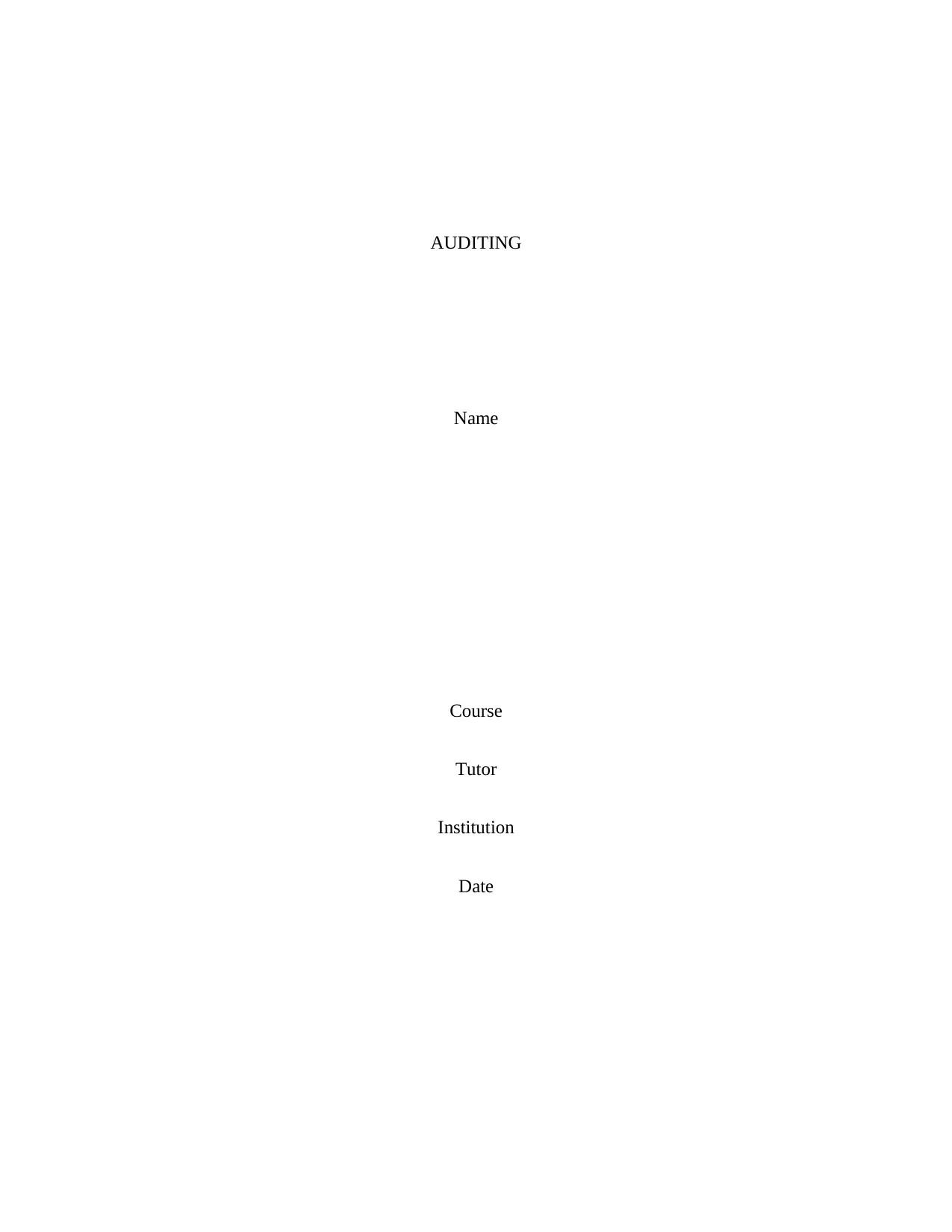
AUDITING
Name
Course
Tutor
Institution
Date
Name
Course
Tutor
Institution
Date
Paraphrase This Document
Need a fresh take? Get an instant paraphrase of this document with our AI Paraphraser
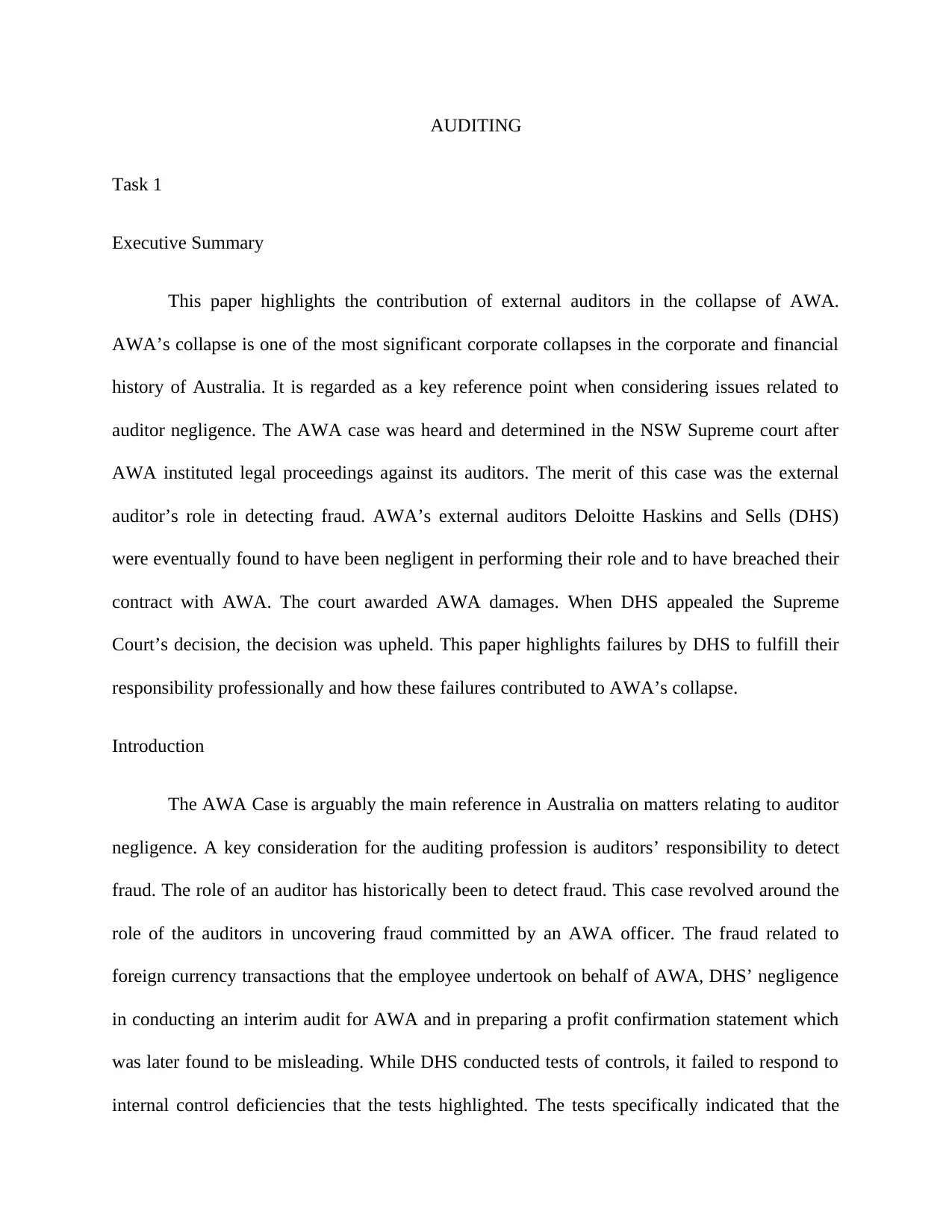
AUDITING
Task 1
Executive Summary
This paper highlights the contribution of external auditors in the collapse of AWA.
AWA’s collapse is one of the most significant corporate collapses in the corporate and financial
history of Australia. It is regarded as a key reference point when considering issues related to
auditor negligence. The AWA case was heard and determined in the NSW Supreme court after
AWA instituted legal proceedings against its auditors. The merit of this case was the external
auditor’s role in detecting fraud. AWA’s external auditors Deloitte Haskins and Sells (DHS)
were eventually found to have been negligent in performing their role and to have breached their
contract with AWA. The court awarded AWA damages. When DHS appealed the Supreme
Court’s decision, the decision was upheld. This paper highlights failures by DHS to fulfill their
responsibility professionally and how these failures contributed to AWA’s collapse.
Introduction
The AWA Case is arguably the main reference in Australia on matters relating to auditor
negligence. A key consideration for the auditing profession is auditors’ responsibility to detect
fraud. The role of an auditor has historically been to detect fraud. This case revolved around the
role of the auditors in uncovering fraud committed by an AWA officer. The fraud related to
foreign currency transactions that the employee undertook on behalf of AWA, DHS’ negligence
in conducting an interim audit for AWA and in preparing a profit confirmation statement which
was later found to be misleading. While DHS conducted tests of controls, it failed to respond to
internal control deficiencies that the tests highlighted. The tests specifically indicated that the
Task 1
Executive Summary
This paper highlights the contribution of external auditors in the collapse of AWA.
AWA’s collapse is one of the most significant corporate collapses in the corporate and financial
history of Australia. It is regarded as a key reference point when considering issues related to
auditor negligence. The AWA case was heard and determined in the NSW Supreme court after
AWA instituted legal proceedings against its auditors. The merit of this case was the external
auditor’s role in detecting fraud. AWA’s external auditors Deloitte Haskins and Sells (DHS)
were eventually found to have been negligent in performing their role and to have breached their
contract with AWA. The court awarded AWA damages. When DHS appealed the Supreme
Court’s decision, the decision was upheld. This paper highlights failures by DHS to fulfill their
responsibility professionally and how these failures contributed to AWA’s collapse.
Introduction
The AWA Case is arguably the main reference in Australia on matters relating to auditor
negligence. A key consideration for the auditing profession is auditors’ responsibility to detect
fraud. The role of an auditor has historically been to detect fraud. This case revolved around the
role of the auditors in uncovering fraud committed by an AWA officer. The fraud related to
foreign currency transactions that the employee undertook on behalf of AWA, DHS’ negligence
in conducting an interim audit for AWA and in preparing a profit confirmation statement which
was later found to be misleading. While DHS conducted tests of controls, it failed to respond to
internal control deficiencies that the tests highlighted. The tests specifically indicated that the
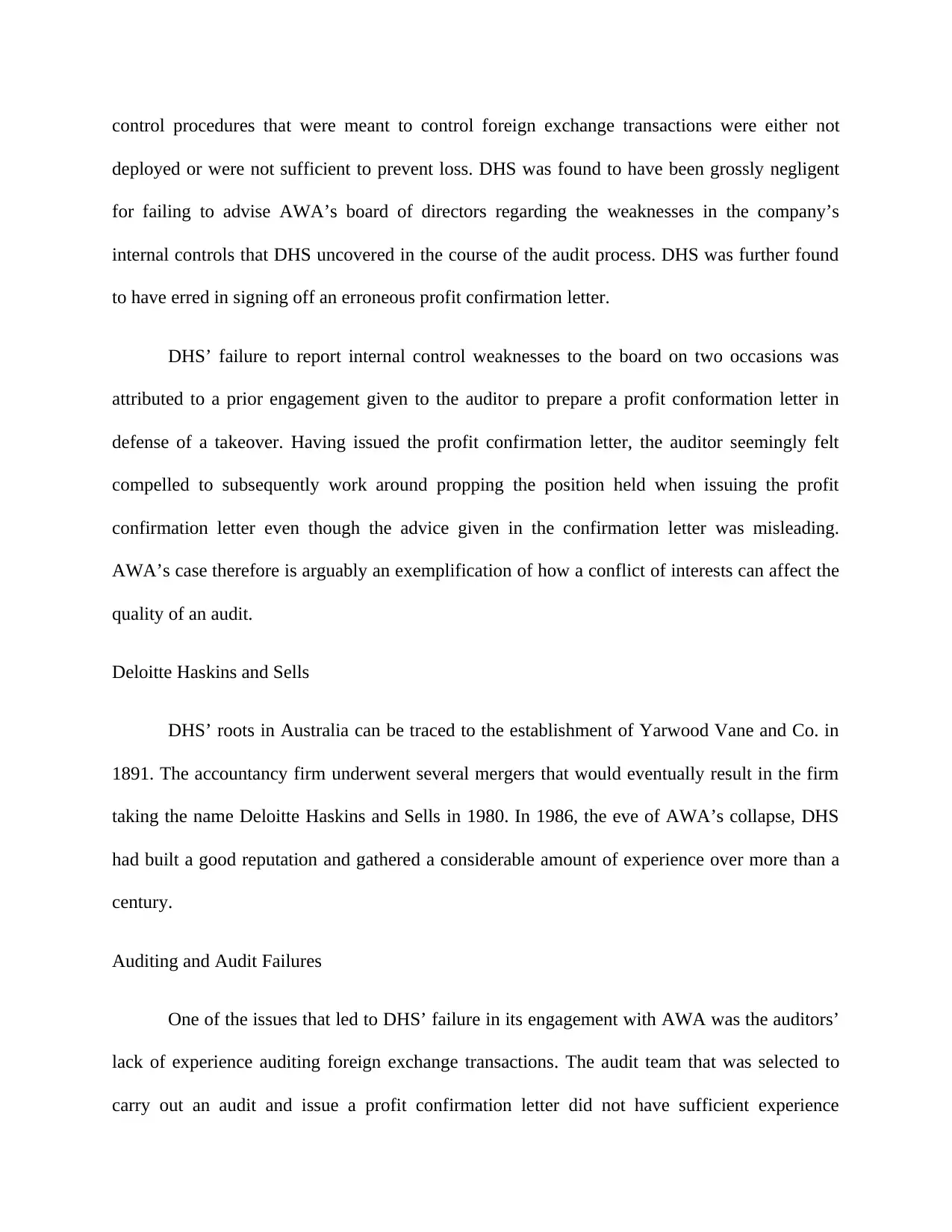
control procedures that were meant to control foreign exchange transactions were either not
deployed or were not sufficient to prevent loss. DHS was found to have been grossly negligent
for failing to advise AWA’s board of directors regarding the weaknesses in the company’s
internal controls that DHS uncovered in the course of the audit process. DHS was further found
to have erred in signing off an erroneous profit confirmation letter.
DHS’ failure to report internal control weaknesses to the board on two occasions was
attributed to a prior engagement given to the auditor to prepare a profit conformation letter in
defense of a takeover. Having issued the profit confirmation letter, the auditor seemingly felt
compelled to subsequently work around propping the position held when issuing the profit
confirmation letter even though the advice given in the confirmation letter was misleading.
AWA’s case therefore is arguably an exemplification of how a conflict of interests can affect the
quality of an audit.
Deloitte Haskins and Sells
DHS’ roots in Australia can be traced to the establishment of Yarwood Vane and Co. in
1891. The accountancy firm underwent several mergers that would eventually result in the firm
taking the name Deloitte Haskins and Sells in 1980. In 1986, the eve of AWA’s collapse, DHS
had built a good reputation and gathered a considerable amount of experience over more than a
century.
Auditing and Audit Failures
One of the issues that led to DHS’ failure in its engagement with AWA was the auditors’
lack of experience auditing foreign exchange transactions. The audit team that was selected to
carry out an audit and issue a profit confirmation letter did not have sufficient experience
deployed or were not sufficient to prevent loss. DHS was found to have been grossly negligent
for failing to advise AWA’s board of directors regarding the weaknesses in the company’s
internal controls that DHS uncovered in the course of the audit process. DHS was further found
to have erred in signing off an erroneous profit confirmation letter.
DHS’ failure to report internal control weaknesses to the board on two occasions was
attributed to a prior engagement given to the auditor to prepare a profit conformation letter in
defense of a takeover. Having issued the profit confirmation letter, the auditor seemingly felt
compelled to subsequently work around propping the position held when issuing the profit
confirmation letter even though the advice given in the confirmation letter was misleading.
AWA’s case therefore is arguably an exemplification of how a conflict of interests can affect the
quality of an audit.
Deloitte Haskins and Sells
DHS’ roots in Australia can be traced to the establishment of Yarwood Vane and Co. in
1891. The accountancy firm underwent several mergers that would eventually result in the firm
taking the name Deloitte Haskins and Sells in 1980. In 1986, the eve of AWA’s collapse, DHS
had built a good reputation and gathered a considerable amount of experience over more than a
century.
Auditing and Audit Failures
One of the issues that led to DHS’ failure in its engagement with AWA was the auditors’
lack of experience auditing foreign exchange transactions. The audit team that was selected to
carry out an audit and issue a profit confirmation letter did not have sufficient experience
⊘ This is a preview!⊘
Do you want full access?
Subscribe today to unlock all pages.

Trusted by 1+ million students worldwide
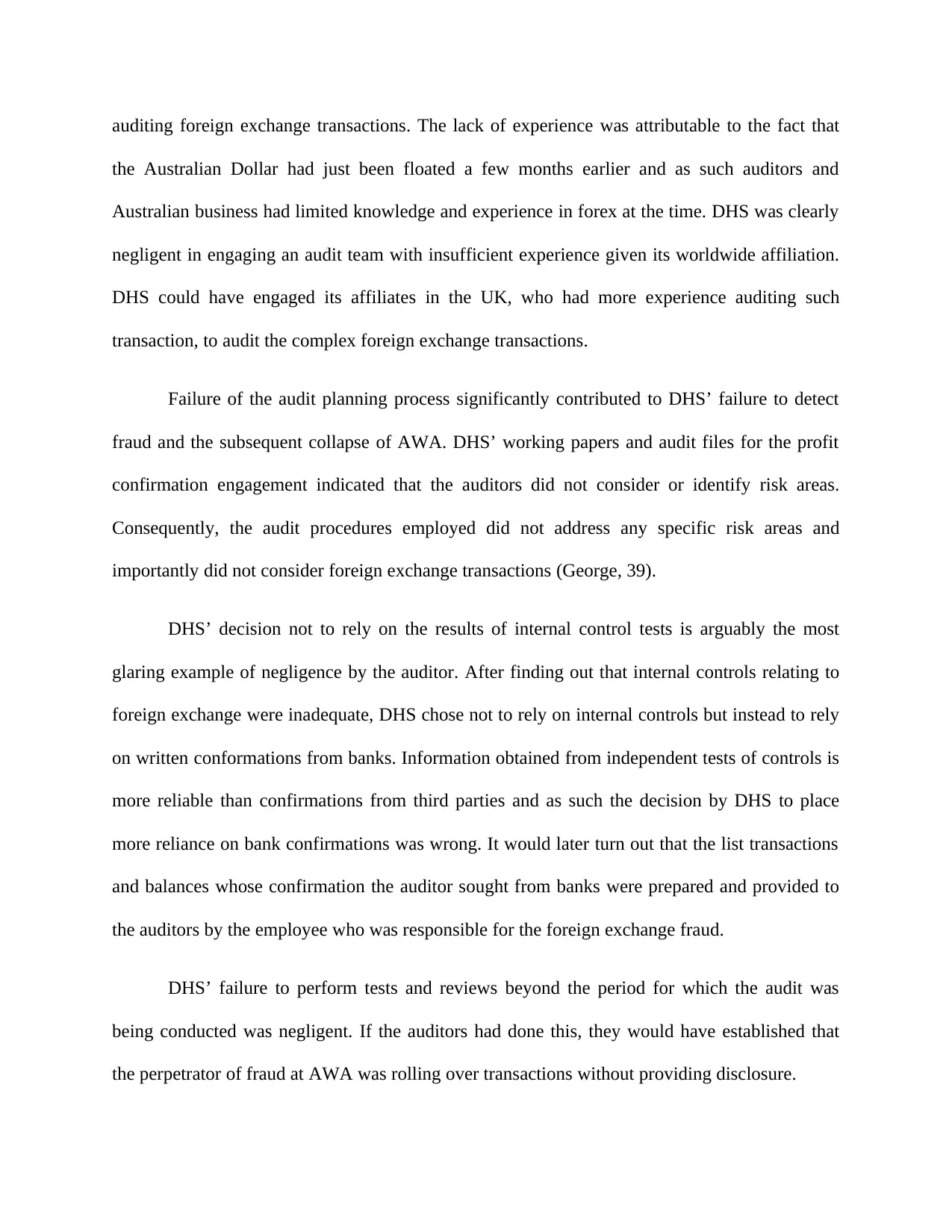
auditing foreign exchange transactions. The lack of experience was attributable to the fact that
the Australian Dollar had just been floated a few months earlier and as such auditors and
Australian business had limited knowledge and experience in forex at the time. DHS was clearly
negligent in engaging an audit team with insufficient experience given its worldwide affiliation.
DHS could have engaged its affiliates in the UK, who had more experience auditing such
transaction, to audit the complex foreign exchange transactions.
Failure of the audit planning process significantly contributed to DHS’ failure to detect
fraud and the subsequent collapse of AWA. DHS’ working papers and audit files for the profit
confirmation engagement indicated that the auditors did not consider or identify risk areas.
Consequently, the audit procedures employed did not address any specific risk areas and
importantly did not consider foreign exchange transactions (George, 39).
DHS’ decision not to rely on the results of internal control tests is arguably the most
glaring example of negligence by the auditor. After finding out that internal controls relating to
foreign exchange were inadequate, DHS chose not to rely on internal controls but instead to rely
on written conformations from banks. Information obtained from independent tests of controls is
more reliable than confirmations from third parties and as such the decision by DHS to place
more reliance on bank confirmations was wrong. It would later turn out that the list transactions
and balances whose confirmation the auditor sought from banks were prepared and provided to
the auditors by the employee who was responsible for the foreign exchange fraud.
DHS’ failure to perform tests and reviews beyond the period for which the audit was
being conducted was negligent. If the auditors had done this, they would have established that
the perpetrator of fraud at AWA was rolling over transactions without providing disclosure.
the Australian Dollar had just been floated a few months earlier and as such auditors and
Australian business had limited knowledge and experience in forex at the time. DHS was clearly
negligent in engaging an audit team with insufficient experience given its worldwide affiliation.
DHS could have engaged its affiliates in the UK, who had more experience auditing such
transaction, to audit the complex foreign exchange transactions.
Failure of the audit planning process significantly contributed to DHS’ failure to detect
fraud and the subsequent collapse of AWA. DHS’ working papers and audit files for the profit
confirmation engagement indicated that the auditors did not consider or identify risk areas.
Consequently, the audit procedures employed did not address any specific risk areas and
importantly did not consider foreign exchange transactions (George, 39).
DHS’ decision not to rely on the results of internal control tests is arguably the most
glaring example of negligence by the auditor. After finding out that internal controls relating to
foreign exchange were inadequate, DHS chose not to rely on internal controls but instead to rely
on written conformations from banks. Information obtained from independent tests of controls is
more reliable than confirmations from third parties and as such the decision by DHS to place
more reliance on bank confirmations was wrong. It would later turn out that the list transactions
and balances whose confirmation the auditor sought from banks were prepared and provided to
the auditors by the employee who was responsible for the foreign exchange fraud.
DHS’ failure to perform tests and reviews beyond the period for which the audit was
being conducted was negligent. If the auditors had done this, they would have established that
the perpetrator of fraud at AWA was rolling over transactions without providing disclosure.
Paraphrase This Document
Need a fresh take? Get an instant paraphrase of this document with our AI Paraphraser
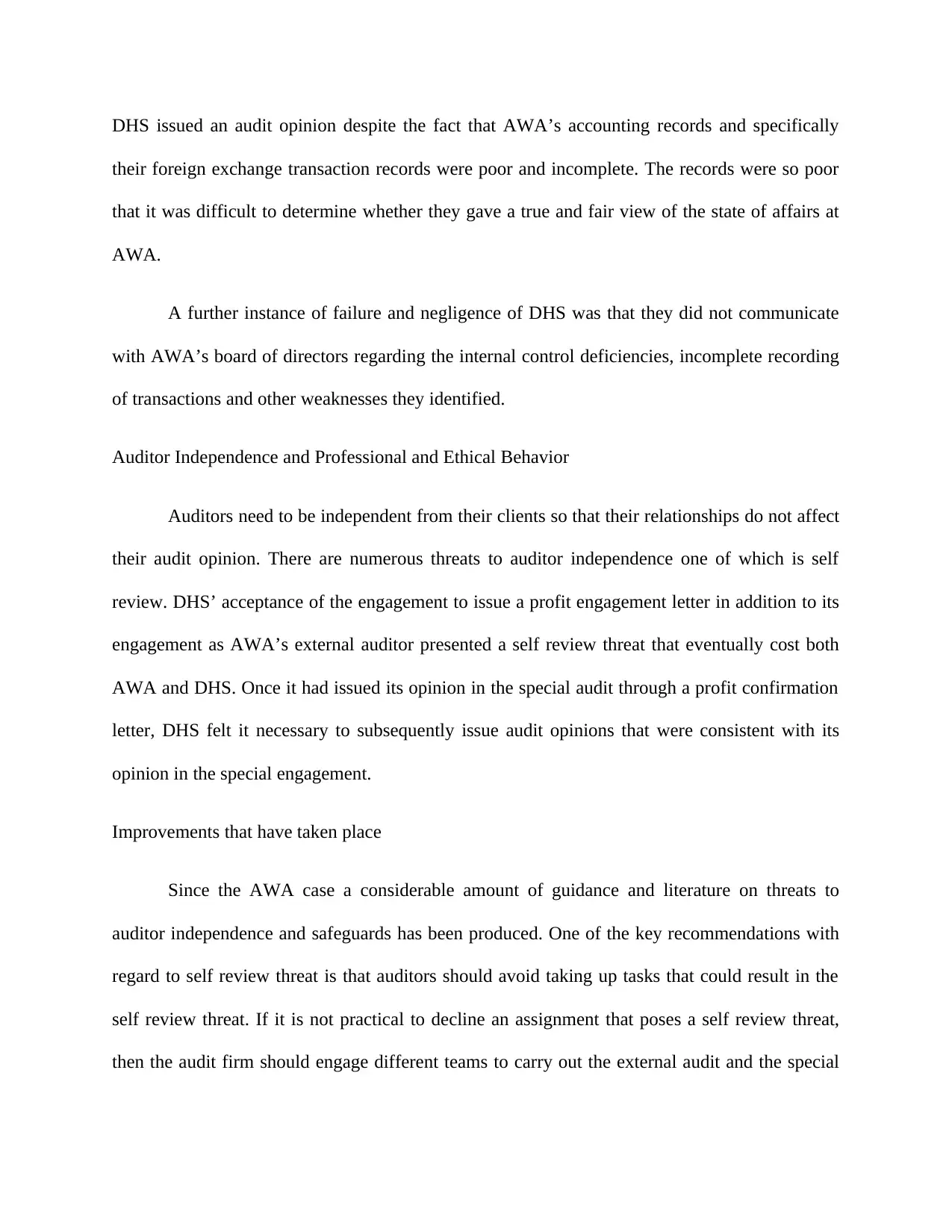
DHS issued an audit opinion despite the fact that AWA’s accounting records and specifically
their foreign exchange transaction records were poor and incomplete. The records were so poor
that it was difficult to determine whether they gave a true and fair view of the state of affairs at
AWA.
A further instance of failure and negligence of DHS was that they did not communicate
with AWA’s board of directors regarding the internal control deficiencies, incomplete recording
of transactions and other weaknesses they identified.
Auditor Independence and Professional and Ethical Behavior
Auditors need to be independent from their clients so that their relationships do not affect
their audit opinion. There are numerous threats to auditor independence one of which is self
review. DHS’ acceptance of the engagement to issue a profit engagement letter in addition to its
engagement as AWA’s external auditor presented a self review threat that eventually cost both
AWA and DHS. Once it had issued its opinion in the special audit through a profit confirmation
letter, DHS felt it necessary to subsequently issue audit opinions that were consistent with its
opinion in the special engagement.
Improvements that have taken place
Since the AWA case a considerable amount of guidance and literature on threats to
auditor independence and safeguards has been produced. One of the key recommendations with
regard to self review threat is that auditors should avoid taking up tasks that could result in the
self review threat. If it is not practical to decline an assignment that poses a self review threat,
then the audit firm should engage different teams to carry out the external audit and the special
their foreign exchange transaction records were poor and incomplete. The records were so poor
that it was difficult to determine whether they gave a true and fair view of the state of affairs at
AWA.
A further instance of failure and negligence of DHS was that they did not communicate
with AWA’s board of directors regarding the internal control deficiencies, incomplete recording
of transactions and other weaknesses they identified.
Auditor Independence and Professional and Ethical Behavior
Auditors need to be independent from their clients so that their relationships do not affect
their audit opinion. There are numerous threats to auditor independence one of which is self
review. DHS’ acceptance of the engagement to issue a profit engagement letter in addition to its
engagement as AWA’s external auditor presented a self review threat that eventually cost both
AWA and DHS. Once it had issued its opinion in the special audit through a profit confirmation
letter, DHS felt it necessary to subsequently issue audit opinions that were consistent with its
opinion in the special engagement.
Improvements that have taken place
Since the AWA case a considerable amount of guidance and literature on threats to
auditor independence and safeguards has been produced. One of the key recommendations with
regard to self review threat is that auditors should avoid taking up tasks that could result in the
self review threat. If it is not practical to decline an assignment that poses a self review threat,
then the audit firm should engage different teams to carry out the external audit and the special
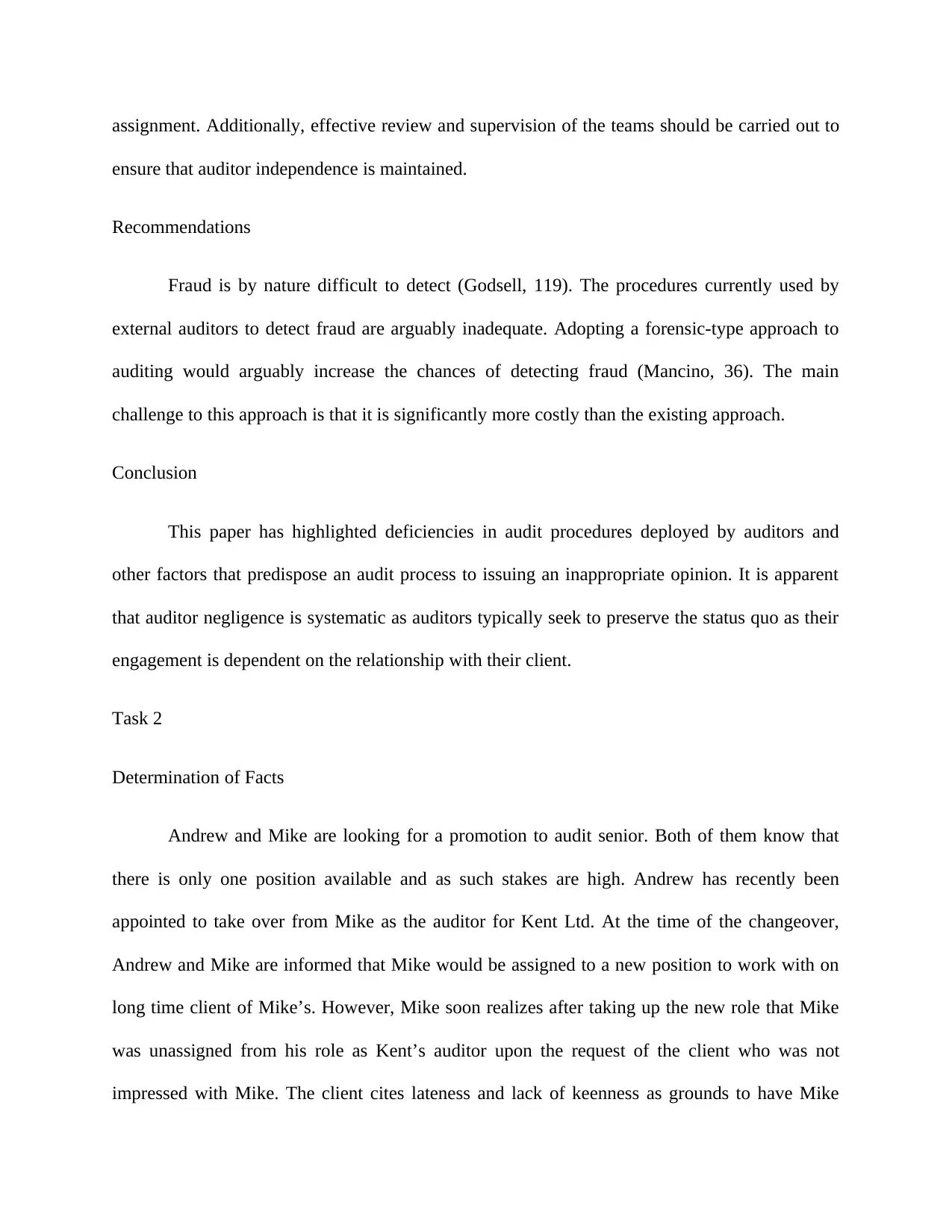
assignment. Additionally, effective review and supervision of the teams should be carried out to
ensure that auditor independence is maintained.
Recommendations
Fraud is by nature difficult to detect (Godsell, 119). The procedures currently used by
external auditors to detect fraud are arguably inadequate. Adopting a forensic-type approach to
auditing would arguably increase the chances of detecting fraud (Mancino, 36). The main
challenge to this approach is that it is significantly more costly than the existing approach.
Conclusion
This paper has highlighted deficiencies in audit procedures deployed by auditors and
other factors that predispose an audit process to issuing an inappropriate opinion. It is apparent
that auditor negligence is systematic as auditors typically seek to preserve the status quo as their
engagement is dependent on the relationship with their client.
Task 2
Determination of Facts
Andrew and Mike are looking for a promotion to audit senior. Both of them know that
there is only one position available and as such stakes are high. Andrew has recently been
appointed to take over from Mike as the auditor for Kent Ltd. At the time of the changeover,
Andrew and Mike are informed that Mike would be assigned to a new position to work with on
long time client of Mike’s. However, Mike soon realizes after taking up the new role that Mike
was unassigned from his role as Kent’s auditor upon the request of the client who was not
impressed with Mike. The client cites lateness and lack of keenness as grounds to have Mike
ensure that auditor independence is maintained.
Recommendations
Fraud is by nature difficult to detect (Godsell, 119). The procedures currently used by
external auditors to detect fraud are arguably inadequate. Adopting a forensic-type approach to
auditing would arguably increase the chances of detecting fraud (Mancino, 36). The main
challenge to this approach is that it is significantly more costly than the existing approach.
Conclusion
This paper has highlighted deficiencies in audit procedures deployed by auditors and
other factors that predispose an audit process to issuing an inappropriate opinion. It is apparent
that auditor negligence is systematic as auditors typically seek to preserve the status quo as their
engagement is dependent on the relationship with their client.
Task 2
Determination of Facts
Andrew and Mike are looking for a promotion to audit senior. Both of them know that
there is only one position available and as such stakes are high. Andrew has recently been
appointed to take over from Mike as the auditor for Kent Ltd. At the time of the changeover,
Andrew and Mike are informed that Mike would be assigned to a new position to work with on
long time client of Mike’s. However, Mike soon realizes after taking up the new role that Mike
was unassigned from his role as Kent’s auditor upon the request of the client who was not
impressed with Mike. The client cites lateness and lack of keenness as grounds to have Mike
⊘ This is a preview!⊘
Do you want full access?
Subscribe today to unlock all pages.

Trusted by 1+ million students worldwide
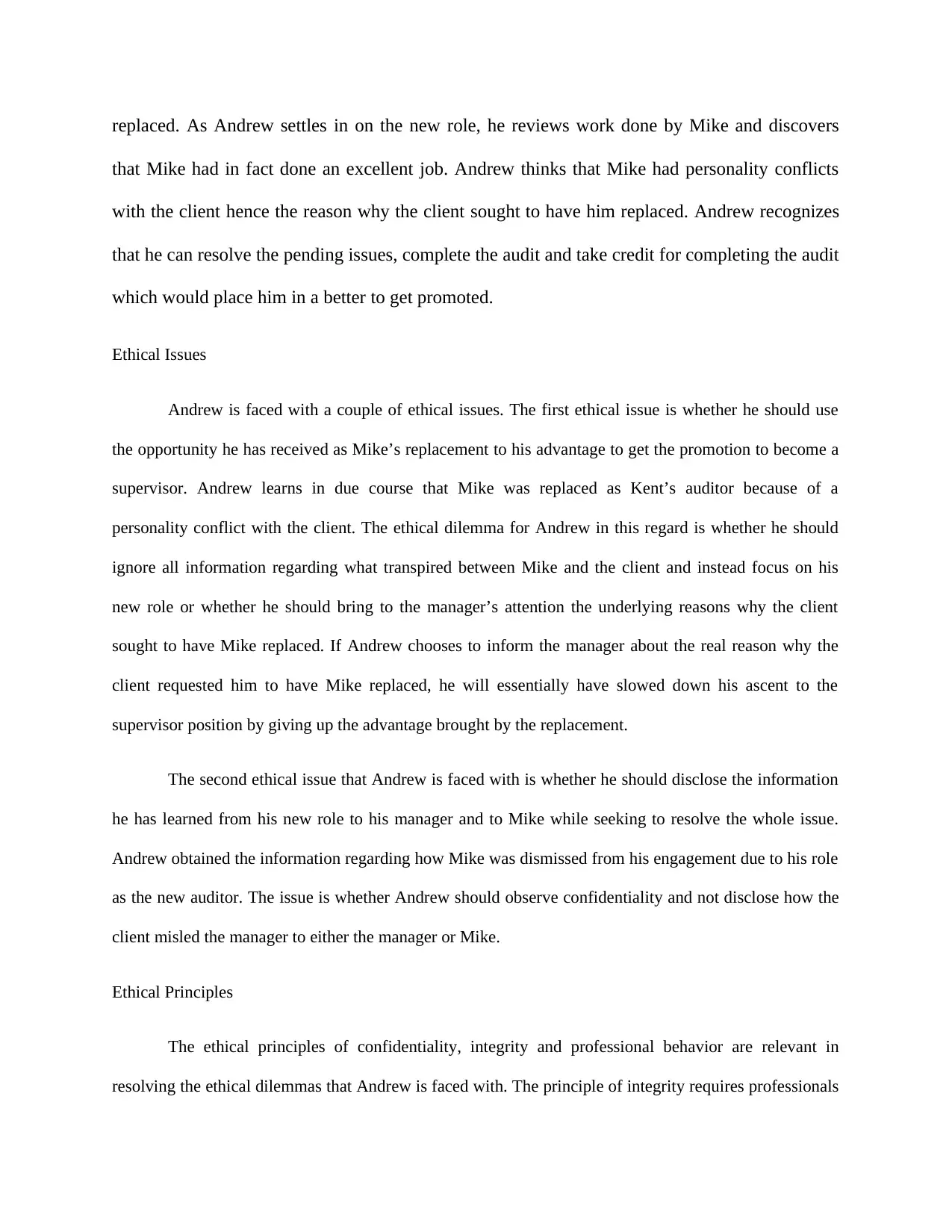
replaced. As Andrew settles in on the new role, he reviews work done by Mike and discovers
that Mike had in fact done an excellent job. Andrew thinks that Mike had personality conflicts
with the client hence the reason why the client sought to have him replaced. Andrew recognizes
that he can resolve the pending issues, complete the audit and take credit for completing the audit
which would place him in a better to get promoted.
Ethical Issues
Andrew is faced with a couple of ethical issues. The first ethical issue is whether he should use
the opportunity he has received as Mike’s replacement to his advantage to get the promotion to become a
supervisor. Andrew learns in due course that Mike was replaced as Kent’s auditor because of a
personality conflict with the client. The ethical dilemma for Andrew in this regard is whether he should
ignore all information regarding what transpired between Mike and the client and instead focus on his
new role or whether he should bring to the manager’s attention the underlying reasons why the client
sought to have Mike replaced. If Andrew chooses to inform the manager about the real reason why the
client requested him to have Mike replaced, he will essentially have slowed down his ascent to the
supervisor position by giving up the advantage brought by the replacement.
The second ethical issue that Andrew is faced with is whether he should disclose the information
he has learned from his new role to his manager and to Mike while seeking to resolve the whole issue.
Andrew obtained the information regarding how Mike was dismissed from his engagement due to his role
as the new auditor. The issue is whether Andrew should observe confidentiality and not disclose how the
client misled the manager to either the manager or Mike.
Ethical Principles
The ethical principles of confidentiality, integrity and professional behavior are relevant in
resolving the ethical dilemmas that Andrew is faced with. The principle of integrity requires professionals
that Mike had in fact done an excellent job. Andrew thinks that Mike had personality conflicts
with the client hence the reason why the client sought to have him replaced. Andrew recognizes
that he can resolve the pending issues, complete the audit and take credit for completing the audit
which would place him in a better to get promoted.
Ethical Issues
Andrew is faced with a couple of ethical issues. The first ethical issue is whether he should use
the opportunity he has received as Mike’s replacement to his advantage to get the promotion to become a
supervisor. Andrew learns in due course that Mike was replaced as Kent’s auditor because of a
personality conflict with the client. The ethical dilemma for Andrew in this regard is whether he should
ignore all information regarding what transpired between Mike and the client and instead focus on his
new role or whether he should bring to the manager’s attention the underlying reasons why the client
sought to have Mike replaced. If Andrew chooses to inform the manager about the real reason why the
client requested him to have Mike replaced, he will essentially have slowed down his ascent to the
supervisor position by giving up the advantage brought by the replacement.
The second ethical issue that Andrew is faced with is whether he should disclose the information
he has learned from his new role to his manager and to Mike while seeking to resolve the whole issue.
Andrew obtained the information regarding how Mike was dismissed from his engagement due to his role
as the new auditor. The issue is whether Andrew should observe confidentiality and not disclose how the
client misled the manager to either the manager or Mike.
Ethical Principles
The ethical principles of confidentiality, integrity and professional behavior are relevant in
resolving the ethical dilemmas that Andrew is faced with. The principle of integrity requires professionals
Paraphrase This Document
Need a fresh take? Get an instant paraphrase of this document with our AI Paraphraser
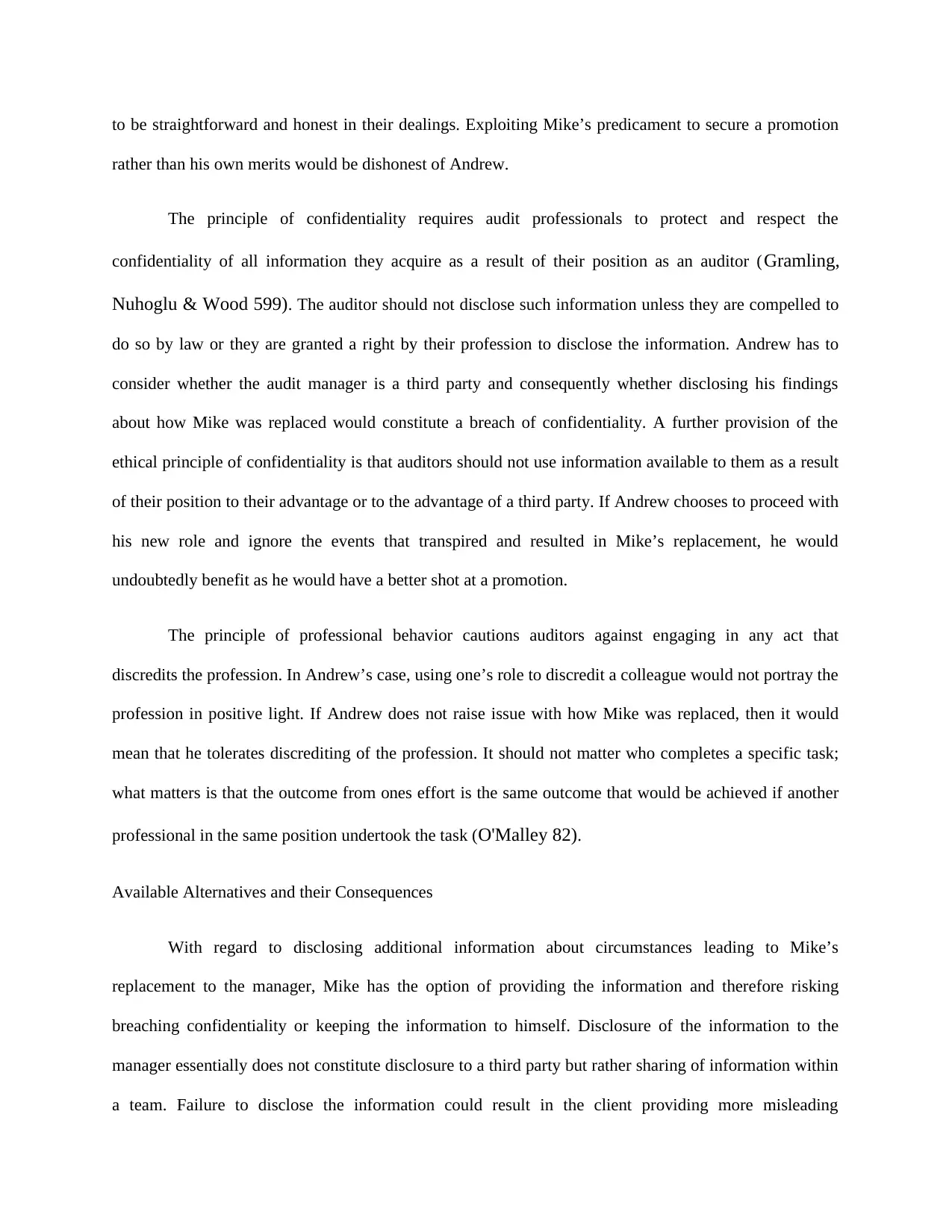
to be straightforward and honest in their dealings. Exploiting Mike’s predicament to secure a promotion
rather than his own merits would be dishonest of Andrew.
The principle of confidentiality requires audit professionals to protect and respect the
confidentiality of all information they acquire as a result of their position as an auditor (Gramling,
Nuhoglu & Wood 599). The auditor should not disclose such information unless they are compelled to
do so by law or they are granted a right by their profession to disclose the information. Andrew has to
consider whether the audit manager is a third party and consequently whether disclosing his findings
about how Mike was replaced would constitute a breach of confidentiality. A further provision of the
ethical principle of confidentiality is that auditors should not use information available to them as a result
of their position to their advantage or to the advantage of a third party. If Andrew chooses to proceed with
his new role and ignore the events that transpired and resulted in Mike’s replacement, he would
undoubtedly benefit as he would have a better shot at a promotion.
The principle of professional behavior cautions auditors against engaging in any act that
discredits the profession. In Andrew’s case, using one’s role to discredit a colleague would not portray the
profession in positive light. If Andrew does not raise issue with how Mike was replaced, then it would
mean that he tolerates discrediting of the profession. It should not matter who completes a specific task;
what matters is that the outcome from ones effort is the same outcome that would be achieved if another
professional in the same position undertook the task (O'Malley 82).
Available Alternatives and their Consequences
With regard to disclosing additional information about circumstances leading to Mike’s
replacement to the manager, Mike has the option of providing the information and therefore risking
breaching confidentiality or keeping the information to himself. Disclosure of the information to the
manager essentially does not constitute disclosure to a third party but rather sharing of information within
a team. Failure to disclose the information could result in the client providing more misleading
rather than his own merits would be dishonest of Andrew.
The principle of confidentiality requires audit professionals to protect and respect the
confidentiality of all information they acquire as a result of their position as an auditor (Gramling,
Nuhoglu & Wood 599). The auditor should not disclose such information unless they are compelled to
do so by law or they are granted a right by their profession to disclose the information. Andrew has to
consider whether the audit manager is a third party and consequently whether disclosing his findings
about how Mike was replaced would constitute a breach of confidentiality. A further provision of the
ethical principle of confidentiality is that auditors should not use information available to them as a result
of their position to their advantage or to the advantage of a third party. If Andrew chooses to proceed with
his new role and ignore the events that transpired and resulted in Mike’s replacement, he would
undoubtedly benefit as he would have a better shot at a promotion.
The principle of professional behavior cautions auditors against engaging in any act that
discredits the profession. In Andrew’s case, using one’s role to discredit a colleague would not portray the
profession in positive light. If Andrew does not raise issue with how Mike was replaced, then it would
mean that he tolerates discrediting of the profession. It should not matter who completes a specific task;
what matters is that the outcome from ones effort is the same outcome that would be achieved if another
professional in the same position undertook the task (O'Malley 82).
Available Alternatives and their Consequences
With regard to disclosing additional information about circumstances leading to Mike’s
replacement to the manager, Mike has the option of providing the information and therefore risking
breaching confidentiality or keeping the information to himself. Disclosure of the information to the
manager essentially does not constitute disclosure to a third party but rather sharing of information within
a team. Failure to disclose the information could result in the client providing more misleading
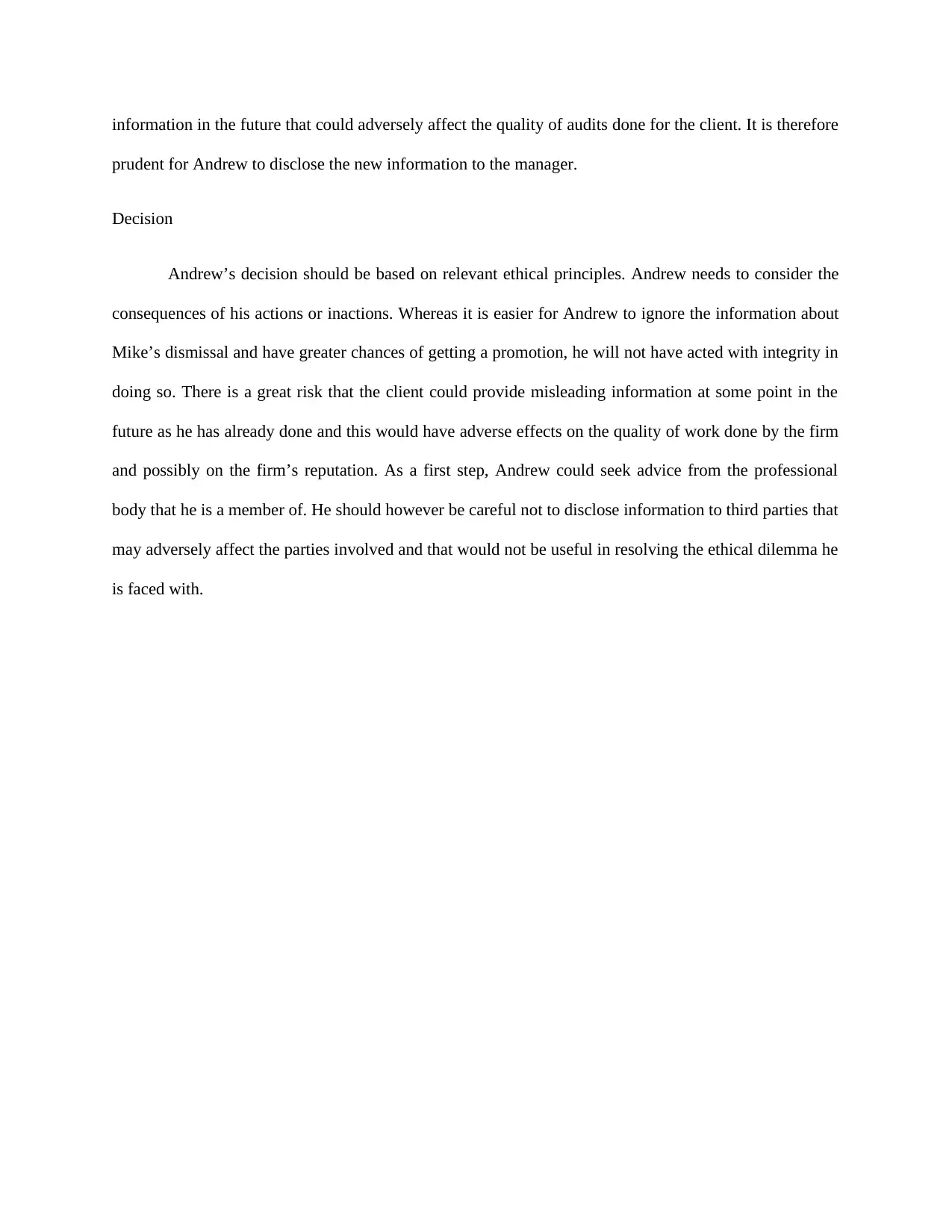
information in the future that could adversely affect the quality of audits done for the client. It is therefore
prudent for Andrew to disclose the new information to the manager.
Decision
Andrew’s decision should be based on relevant ethical principles. Andrew needs to consider the
consequences of his actions or inactions. Whereas it is easier for Andrew to ignore the information about
Mike’s dismissal and have greater chances of getting a promotion, he will not have acted with integrity in
doing so. There is a great risk that the client could provide misleading information at some point in the
future as he has already done and this would have adverse effects on the quality of work done by the firm
and possibly on the firm’s reputation. As a first step, Andrew could seek advice from the professional
body that he is a member of. He should however be careful not to disclose information to third parties that
may adversely affect the parties involved and that would not be useful in resolving the ethical dilemma he
is faced with.
prudent for Andrew to disclose the new information to the manager.
Decision
Andrew’s decision should be based on relevant ethical principles. Andrew needs to consider the
consequences of his actions or inactions. Whereas it is easier for Andrew to ignore the information about
Mike’s dismissal and have greater chances of getting a promotion, he will not have acted with integrity in
doing so. There is a great risk that the client could provide misleading information at some point in the
future as he has already done and this would have adverse effects on the quality of work done by the firm
and possibly on the firm’s reputation. As a first step, Andrew could seek advice from the professional
body that he is a member of. He should however be careful not to disclose information to third parties that
may adversely affect the parties involved and that would not be useful in resolving the ethical dilemma he
is faced with.
⊘ This is a preview!⊘
Do you want full access?
Subscribe today to unlock all pages.

Trusted by 1+ million students worldwide
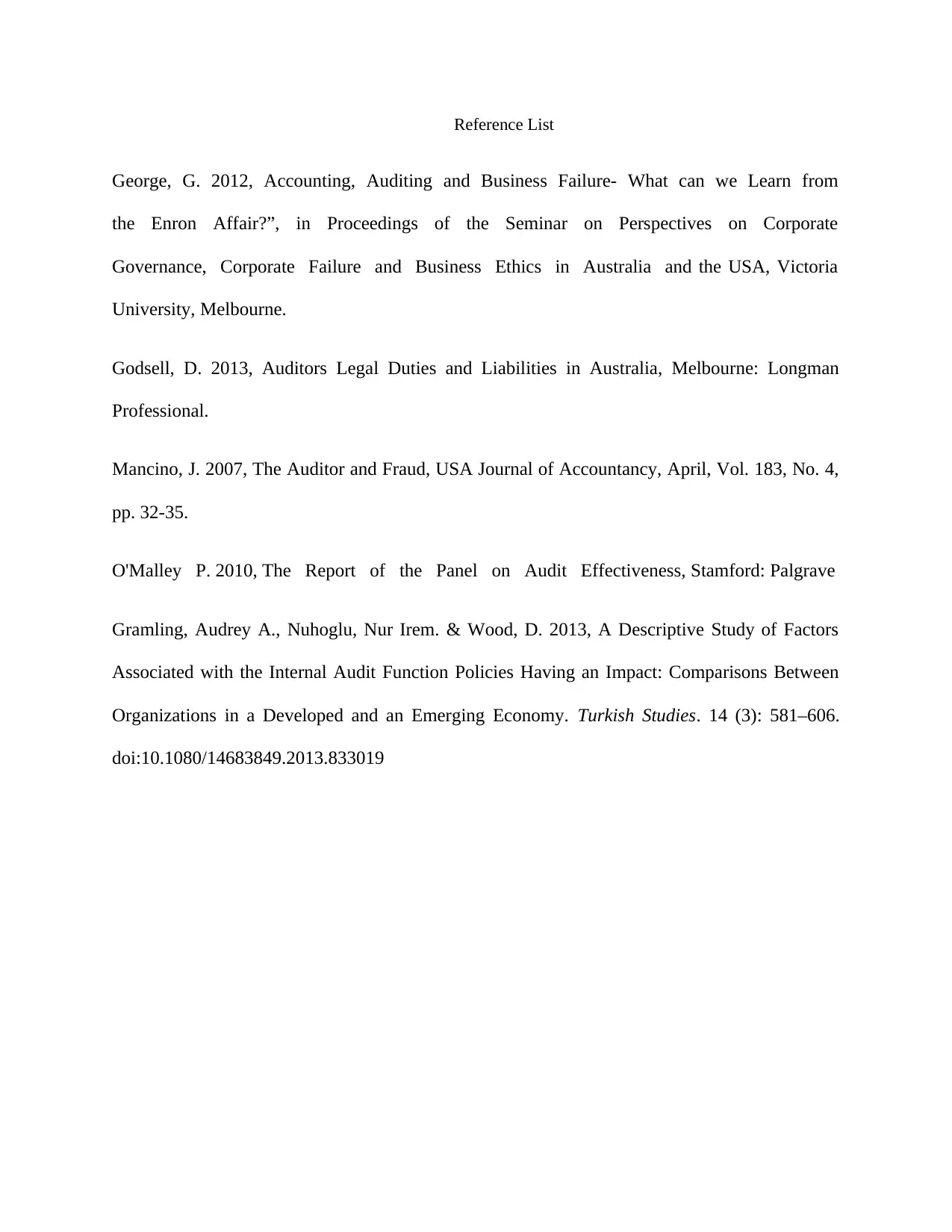
Reference List
George, G. 2012, Accounting, Auditing and Business Failure- What can we Learn from
the Enron Affair?”, in Proceedings of the Seminar on Perspectives on Corporate
Governance, Corporate Failure and Business Ethics in Australia and the USA, Victoria
University, Melbourne.
Godsell, D. 2013, Auditors Legal Duties and Liabilities in Australia, Melbourne: Longman
Professional.
Mancino, J. 2007, The Auditor and Fraud, USA Journal of Accountancy, April, Vol. 183, No. 4,
pp. 32-35.
O'Malley P. 2010, The Report of the Panel on Audit Effectiveness, Stamford: Palgrave
Gramling, Audrey A., Nuhoglu, Nur Irem. & Wood, D. 2013, A Descriptive Study of Factors
Associated with the Internal Audit Function Policies Having an Impact: Comparisons Between
Organizations in a Developed and an Emerging Economy. Turkish Studies. 14 (3): 581–606.
doi:10.1080/14683849.2013.833019
George, G. 2012, Accounting, Auditing and Business Failure- What can we Learn from
the Enron Affair?”, in Proceedings of the Seminar on Perspectives on Corporate
Governance, Corporate Failure and Business Ethics in Australia and the USA, Victoria
University, Melbourne.
Godsell, D. 2013, Auditors Legal Duties and Liabilities in Australia, Melbourne: Longman
Professional.
Mancino, J. 2007, The Auditor and Fraud, USA Journal of Accountancy, April, Vol. 183, No. 4,
pp. 32-35.
O'Malley P. 2010, The Report of the Panel on Audit Effectiveness, Stamford: Palgrave
Gramling, Audrey A., Nuhoglu, Nur Irem. & Wood, D. 2013, A Descriptive Study of Factors
Associated with the Internal Audit Function Policies Having an Impact: Comparisons Between
Organizations in a Developed and an Emerging Economy. Turkish Studies. 14 (3): 581–606.
doi:10.1080/14683849.2013.833019
1 out of 10
Related Documents
Your All-in-One AI-Powered Toolkit for Academic Success.
+13062052269
info@desklib.com
Available 24*7 on WhatsApp / Email
![[object Object]](/_next/static/media/star-bottom.7253800d.svg)
Unlock your academic potential
Copyright © 2020–2025 A2Z Services. All Rights Reserved. Developed and managed by ZUCOL.



